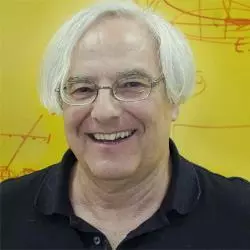
Claudio Franceschi
Claudio Franceschi has been Professor emeritus at the University of Bologna in Italy since 2016. After his initial medical training, he devoted himself to the study of human immunology and has held numerous positions including scientific director of the Italian National Research Center for Aging, as well as founding and directing the “Luigi Galvani” Center for Integrated Studies of Bioinformatics, Biophysics and Biocomplexity at the University of Bologna.
Research, collaboration, distinctions
In the late 1980s, at a time when experiments tended to study mice more than humans, Claudio Franceschi was one of the first to become interested in the issue of aging in humans and went on to become one of the most renowned international experts in this area. In the 1990s, he published research on anomalies of cellular immunity and the presence of a state of chronic infammation (referred to as "inflammaging" by Prof. Franceschi). A completely new concept at the time, it is now studied under the title immunosenescence.
Since 2010, he has published a number of pioneering studies on human aging based on a cohort of centenarians and their offspring or spouses. Primarily, he noted that centenarians or those over a hundred years old are a model for successful aging without comorbid conditions (illnesses or disorders linked to age), which paved the way to understanding the mechanims of these comorbid conditions (cancer, neurodegeneration, cardiovascular, metabolic and auto-immune disorders, etc.), which are so prevalent in today’s so-called “developed” societies. The variety of approaches he has employed, the quantity and quality of his often-pioneering work, and the insatiable curiosity that has pervaded his work throughout his career together have made him a significant contributor to this still mysterious field of knowledge.
Education:
1967/07, MD, Pathology /Immunology, University of Bologna, Italy
Positions and Employment:
• 2018 to present Editor-in-Chief of Ageing Research Reviews, the journal with the highest impact factor (IF: 8.973) in Gerontology and Geriatrics
• 2016 Professor Emeritus of Immunology, University of Bologna, Italy
• 1998-2013 Full Professor of Immunology, University of Bologna, Italy
• 2010-2012 Director of the Department of Experimental Pathology, University of Bologna
• 2001-2006; 2012 Director of the Interdepartmental Center for Studies on Bioinformatics and Biocomplexity "Luigi Galvani", University of Bologna
• 1986-1998 Full Professor of Immunology, University of Modena, Italy
• S1996-2005 Scientific Director of Italian National Research Center for Aging (INRCA, IRCCS), the public national institution of the Italian Ministry of Health devoted to aging research and care of elderly (7 geriatric hospitals in Italy, 1500 total employees, 400 researchers and MDs and a research Department of Gerontology in Ancona, Italy).
• 1980-1986 Full Professor of Immunology, University of Padova, Italy
Selected Honors:
•March 2018: Laurea Honoris Causa Université de Bordeaux, France.
Editor, together with T Fulop, K Hirokawa and G Pawelec of the HANDBOOK ON IMMUNOSENESCENCE: basic understanding and clinical applications. Springer 2009, a 1,650-page 2-volume encyclopedia on aging research with 78 articles and 94292 downloads, ISBN 978-1-4020-9063-1. The second edition 2019 is in press.
Most Cited Publications:
Chronic Inflammation (Inflammaging) and Its Potential Contribution to Age-Associated Diseases
Inflammaging and anti-inflammaging: a systemic perspective on aging and longevity emerged from studies in humans
Through ageing, and beyond: gut microbiota and inflammatory status in seniors and centenarians
A new method for the cytofluorometric analysis of mitochondrial membrane potential using the J-aggregate forming lipophilic cation 5, 5′, 6, 6′-tetrachloro-1, 1′, 3, 3 …
JC-1, but not DiOC6 (3) or rhodamine 123, is a reliable fluorescent probe to assess ΔΨ changes in intact cells: implications for studies on mitochondrial functionality during …
No items yet!
No items yet!
